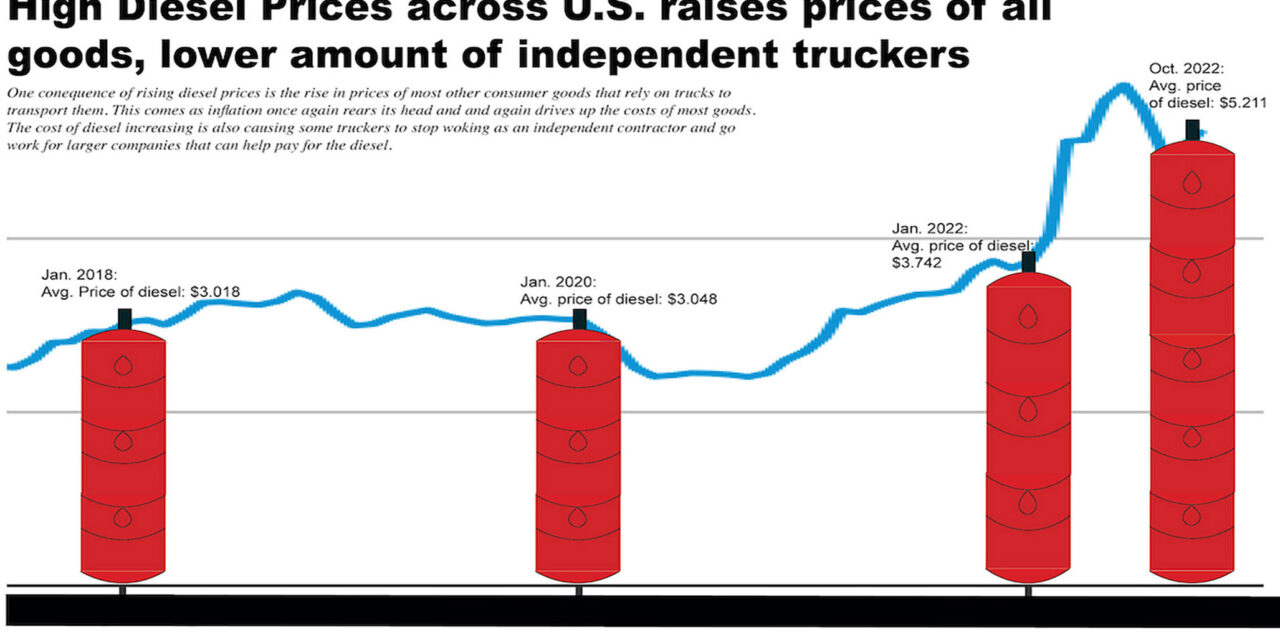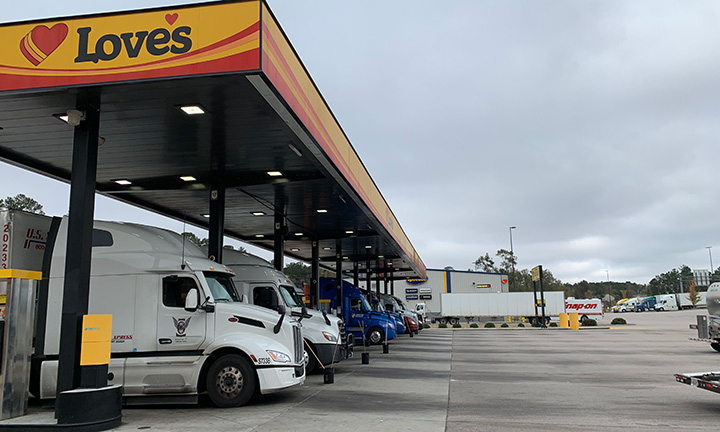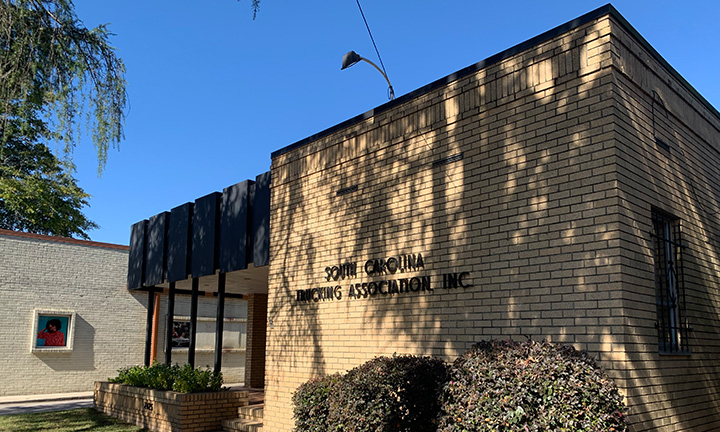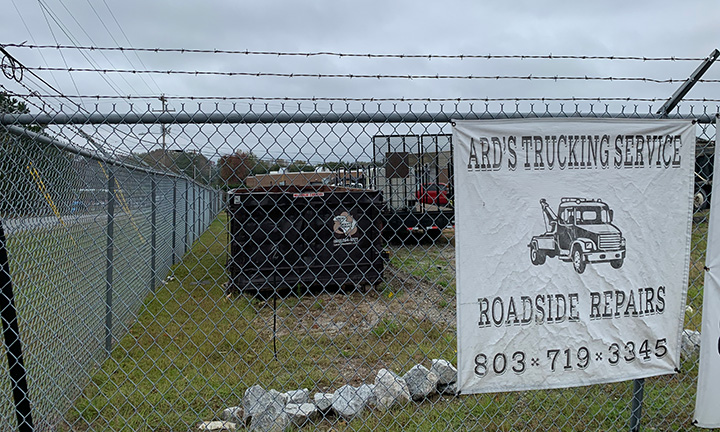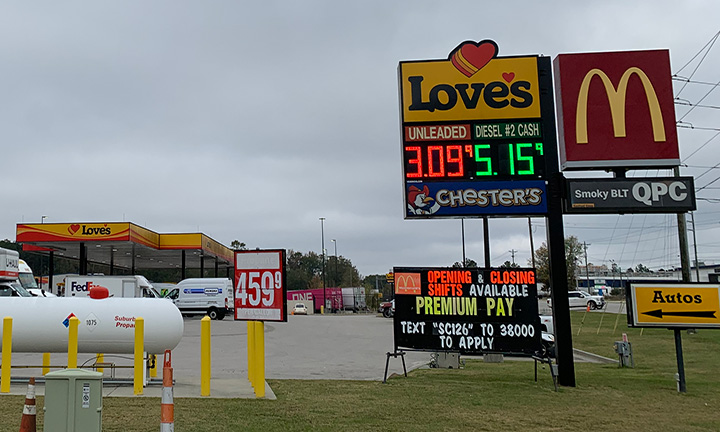(Graphic and photos by Tyler Fedor)
Marcelano Gonzalez has been an independent trucker for more than 20 years. However, as diesel prices rise and begin to take larger chunks out of the earnings of truckers, Gonzalez said he intends to sell his truck and trailer. He’ll instead go work for a company that can help pay for the diesel.
“I see many people already take loans,” Gonzalez said while at a gas station outside of Columbia on I-77. “They don’t make enough money to pay for their diesel.”
He’s not alone. As diesel fuel costs rise above $5 per gallon in South Carolina, independent truckers coming through Columbia have said they’ve lost earnings and have even given up being a lone trucker, while fleet owners said they’re eating the cost.
Diesel fuel has cost $5.25 on average so far this November, compared to $5.57 six months ago, according to the U.S. Energy Information Administration. Last year, it was $3.72.
Prices have risen to this level for two main reasons, according to Joey Von Nessen, a research economist at the University of South Carolina. The first is the war between Russia and Ukraine. Russia is a major fuel exporter – the exports have been halted since the war began. The second is the remaining effects of the COVID-19 shutdown two years ago.
Von Nessen said it’s inaccurate to call the situation a “resource” shortage. Instead, the diesel itself is getting held up in the supply chain.
“If we look at the additional supply chain constraints, due to energy, the limited ability to import energy from overseas, that exacerbates it as well,” Von Nessen said.
Regardless of the reason, the high cost of diesel can increase the cost of most everything else.
“The lifeblood of the U.S. economy comes from the logistics industry,” Von Nessen said.
For example, Amazon established a 5% “fuel and inflation surcharge” in April for sellers that use Amazon to ship their goods. Often, the cost is pushed on to consumers, raising the prices of goods, such as holiday gifts.
Also, the increase in demand for consumer goods since the COVID-19 shutdown has strained America’s refineries — the factories that turn oil into gas.
The United States hasn’t opened a new refinery since 1977, according to Rick Todd, president and CEO of the S.C. Trucking Association. Since the country has opened back up after the worst of COVID, there has been a “quadruple” increase in demand for diesel fuel since the pandemic, he said.
“The refineries we do have and that are still in service are running at max capacity,” Todd said.
Truckers who work for themselves usually pay for the diesel out of their own pocket.
For Matt Cudanin, who became an independent trucker last year because of the potential for high paychecks, said the current diesel prices can take up to half his earnings. In June 2021, a gallon of diesel cost an average of $3.29 per gallon.
“Oh, I’m not happy about it,” Cudanin said. “Obviously, when you go from $450 to $500 filling up to $800, that’s a big, big jump when you’re filling up three to four times a week.”
What’s more, the higher gas prices have made it harder for independent truckers such as Cudanin to negotiate hauling rates with industry brokers.
Cudanin said he has taken fewer long-distance jobs since his income squeeze, preferring to stay in the Southeast.
“It’s not really worth spending a lot of money,” Cudanin said.
Stephen Ard, owner of the Columbia-based Ard’s Trucking, secures jobs for his drivers and sets their hourly pay. He said he feels comfortable his fleet and truckers can survive the rise in prices.
He said he raised the hourly rate his truckers get from $85 to $95 earlier this year, and may raise it to $100 in April.
But another problem fleet owners face is timing. Sometimes, trucking companies don’t get paid immediately by their clients, so they must take out loans to cover high gas prices. Todd said the wait on pay can be troublesome for smaller fleets needing to pay for diesel that then have to rely on good credit to purchase diesel in bulk.
“That’s a real cash load balancing act for a small, marginal fleet,” Todd said. “Any business cash flow is what you have to have to keep the business running.”
Gonzalez said in his final days of trucking for himself, he’s still having to limit what jobs he takes depending on the pay as he deals with rising expenses of not just diesel, but all other goods.
“So you don’t pay me enough. I don’t move it at all,” Gonzalez said.
A row of trucks fill the lot at the Love’s gas station on Bluff Road to fill up on diesel.
The South Carolina Trucking Association headquarters is on Devine Street.
A poster advertising Ard’s Trucking Services in Columbia at its location in the Columbia Industrial Park.
The busy Love’s gas station attracts long-distance haulers because it’s near Interstate 77.

